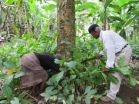(Press-News.org) Research led by the University of Adelaide has resulted in new insights into clinical depression that demonstrate there cannot be a "one-size-fits-all" approach to treating the disease.
As part of their findings, the researchers have developed a new model for clinical depression that takes into account the dynamic role of the immune system. This neuroimmune interaction results in different phases of depression, and has implications for current treatment practices.
"Depression is much more complex than we have previously understood," says senior author Professor Bernhard Baune, Head of Psychiatry at the University of Adelaide.
"Past research has shown that there are inflammatory mechanisms at work in depression. But in the last 10 years there has been much research into the complexities of how the immune system interacts with brain function, both in healthy brains and in people experiencing depression.
"Unfortunately, much of the research is contradictory – and in asking ourselves why, we undertook a review of all the studies conducted to date on these issues.
"This has led us to the conclusion that there are different immune factors at work in depression depending on the clinical phase of depression, and that the genes for this immune response are switched on and off at different times according to phases.
"What we see in the clinical states of acute depression, relapse, remission, and recovery is a highly complex interaction between inflammatory and other immunological cells, brain cells and systems.
"This new model helps us to overcome the simplistic notion that depression is the same kind of disease for everyone, behaving in the same way regardless of the timing of the disease. We can now see that depression is a much more neurobiologically dynamic disease, and this has many implications for both research and treatment," Professor Baune says.
Professor Baune says clinicians and patients alike should be aware that common treatments for depression may, at times, not work based on this new understanding of neuroimmune phases in the disease.
"We are urging caution on the use of blanket anti-inflammatory medication for the treatment of depression. This treatment may need to be tailored according to the phase of illness a patient is undergoing, and this would require an immune profile of the patient prior to treatment," Professor Baune says.
INFORMATION:
The results of this study are published in the international journal Progress in Neuro-Psychopharmacology & Biological Psychiatry.
Phases of clinical depression could affect treatment
2014-08-04
ELSE PRESS RELEASES FROM THIS DATE:
Analysis of African plant reveals possible treatment for aging brain
2014-08-04
LA JOLLA—For hundreds of years, healers in São Tomé e Príncipe—an island off the western coast of Africa—have prescribed cata-manginga leaves and bark to their patients. These pickings from the Voacanga africana tree are said to decrease inflammation and ease the symptoms of mental disorders.
Now, scientists at the Salk Institute for Biological Studies have discovered that the power of the plant isn't just folklore: a compound isolated from Voacanga africana protects cells from altered molecular pathways linked to Alzheimer's disease, Parkinson's disease and the neurodegeneration ...
Becoming bad through video games
2014-08-04
Previous studies show that violent video games increase adolescent aggressiveness, but new Dartmouth research finds for the first time that teen-agers who play mature-rated, risk-glorifying video games are more likely subsequently to engage in a wide range of deviant behaviors beyond aggression, including alcohol use, smoking cigarettes, delinquency and risky sex.
More generally, such games – especially character-based games with anti-social protagonists – appear to affect how adolescents think of themselves, with potential consequences for their alter ego in the real ...
Still no 'justice for all' for female athletes
2014-08-04
Spanish hurdler María José Martínez-Patiño, who in the 1980s endured harsh global media attention when she was subjected to unscientific gender tests, is co-author of a study that takes stock of current sexual verification policies in athletics. While such policies were originally designed to weed out men who impersonate women at female-only events, issues of privacy and confidentiality remain paramount to safeguard athletes from unnecessary embarrassment, says Nathan Ha of the University of California Los Angeles in the US, lead author of the review in Springer's journal ...
Attention, bosses: web-surfing at work has its benefits
2014-08-04
A new e-memo for the boss: Online breaks at work can refresh workers and boost productivity. Early findings from a University of Cincinnati study will be presented on Aug. 5, at the 74th annual meeting of the Academy of Management in Philadelphia.
The study led by Sung Doo Kim, a doctoral candidate in the Carl H. Lindner College of Business, opens a rare avenue of research into coping with technology-induced distractions in our contemporary society.
Previous research has focused on breaks during off-job hours such as evening, weekend and vacation periods, or on traditional ...
Fruit flies going high-tech: How touchscreen technology helps to understand eating habits
2014-08-04
A new study reveals surprising similarities between the way mammals and flies eat. What and how we eat is a crucial determinant of health and wellbeing. Model organisms such as fruit flies have provided crucial insights into how our brain decides what and how much to eat. But until now it was not clear how similar eating was in fruit flies and mammals (vertebrates).
In a paper published today (Itskov et. al 2014) in the scientific journal Nature Communications, scientists from the Champalimaud Neuroscience Programme, Lisbon, Portugal, in collaboration with the University ...
Nanoscale details of electrochemical reactions in electric vehicle battery materials
2014-08-04
UPTON, NY-Using a new method to track the electrochemical reactions in a common electric vehicle battery material under operating conditions, scientists at the U.S. Department of Energy's Brookhaven National Laboratory have revealed new insight into why fast charging inhibits this material's performance. The study also provides the first direct experimental evidence to support a particular model of the electrochemical reaction. The results, published August 4, 2014, in Nature Communications, could provide guidance to inform battery makers' efforts to optimize materials ...
Eating resistant starch may help reduce red meat-related colorectal cancer risk
2014-08-04
PHILADELPHIA — Consumption of a type of starch that acts like fiber may help reduce colorectal cancer risk associated with a high red meat diet, according to a study published in Cancer Prevention Research, a journal of the American Association for Cancer Research.
"Red meat and resistant starch have opposite effects on the colorectal cancer-promoting miRNAs, the miR-17-92 cluster," said Karen J. Humphreys, PhD, a research associate at the Flinders Center for Innovation in Cancer at Flinders University in Adelaide, Australia. "This finding supports consumption of resistant ...
Video-game playing for less than an hour a day is linked with better-adjusted children
2014-08-04
A new study suggests video game-playing for less than an hour a day is linked with better-adjusted children and teenagers. The research, carried out by Oxford University, found that young people who indulged in a little video game-playing were associated with being better adjusted than those who had never played or those who were on video games for three hours or more. The study finds no positive or negative effects for young people who played 'moderately' between one to three hours a day. However, the study, published in the journal, Pediatrics, suggests that the influence ...
WSU researchers see violent era in ancient Southwest
2014-08-04
PULLMAN, Wash.—It's a given that, in numbers terms, the 20th Century was the most violent in history, with civil war, purges and two World Wars killing as many as 200 million people.
But on a per-capita basis, Washington State University archaeologist Tim Kohler has documented a particularly bloody period more than eight centuries ago on what is now American soil. Between 1140 and 1180, in the central Mesa Verde of southwest Colorado, four relatively peaceful centuries of pueblo living devolved into several decades of violence.
Writing in the journal American Antiquity, ...
Kangaroos win when Aborigines hunt with fire
2014-08-04
SALT LAKE CITY, Aug. 4, 2014 – Australia's Aboriginal Martu people hunt kangaroos and set small grass fires to catch lizards, as they have for at least 2,000 years. A University of Utah researcher found such man-made disruption boosts kangaroo populations – showing how co-evolution helped marsupials and made Aborigines into unintentional conservationists.
"We have uncovered a framework that allows us to predict when human subsistence practices might be detrimental to the environment and when they might be beneficial," says Brian Codding, an assistant professor of anthropology.
"When ...



